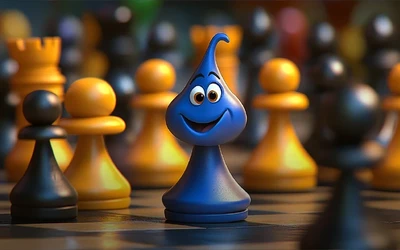
Photo by Johannes Plenio on Pexels
The Psychological Aspect of Chess: Building Mental Resilience
Chess is often described as a battle of minds, where success depends not only on skill and strategy but also on mental strength. Whether you're playing in a tournament or an online blitz game, your ability to stay focused, handle pressure, and recover from setbacks plays a huge role in your performance. So, how can you build mental resilience in chess? Let’s dive into some key psychological aspects and practical strategies.As a coach, I know the right mindset for classical games: patience, deep focus, and mental endurance. But applying it myself in tournaments has always been a challenge. I started chess very young, without professional guidance to develop the right mental habits. I don’t want others to fall into the same trap. Losing focus in long games is something I still work on, and I’ve explored different ways to improve it. In this post, I’ll share what has helped me and what I’ve learned from coaching players who face the same struggle.
1. Dealing with Losses: Learn, Don’t Lament
Losses are inevitable in chess. Even world champions lose games. The difference between a strong player and an average one is how they react to defeat. Instead of dwelling on a loss, analyze the game objectively. Ask yourself:
- What went wrong?
- At what moment did the game slip out of my control?
- Did I manage my time well?
- Was it a tactical oversight or a positional misunderstanding?
Every loss is a lesson. The best players use their defeats as stepping stones to improvement rather than as emotional setbacks.
2. Controlling Emotions: The Power of a Calm Mind
Ever blundered because of frustration? Tilt, as many call it, is one of the biggest dangers in chess. Emotional control is key to maintaining consistency in your games. Here’s how you can manage emotions:
- Pause and breathe: If you blunder, take a deep breath before making your next move. Avoid reacting impulsively.
- Stick to your plan: Even when under pressure, trust your preparation. Panic often leads to bad decisions.
- Develop a post-game routine: Whether it’s taking a short walk, drinking water, or closing your eyes for a moment, find a routine that helps you reset after a stressful game.
3. The Art of Focus: Training Your Attention Span
In the age of social media and fast-paced distractions, maintaining focus for long games can be challenging. Here are some ways to improve concentration:
- Play longer time controls: If you mostly play blitz or bullet, try switching to rapid or classical games. These formats force you to think deeply.
- Practice visualization: Try to analyze positions in your head without moving the pieces. This strengthens your ability to calculate and focus.
- Use meditation or mindfulness techniques: Even a few minutes of mindfulness exercises before a game can help you clear distractions and improve focus.
4. Handling Pressure: Developing Tournament Toughness
Performing well in high-stakes games requires mental toughness. Whether it's your first tournament or an online event, pressure can lead to nervous mistakes. Here’s how to handle it:
- Simulate tournament conditions: Practice under real conditions. set a timer, play without distractions, and follow tournament rules.
- Embrace discomfort: Some nerves are good! They mean you care about your performance. The key is to channel that energy into focus rather than panic.
- Keep a balanced mindset: Don’t put too much pressure on yourself to win every game. Instead, focus on playing good moves.
5. Building a Growth Mindset: Progress Over Perfection
The best chess players view improvement as a long-term journey rather than seeking immediate perfection. Here’s how to develop this mindset:
- Set process-oriented goals: Instead of aiming to gain 100 rating points in a month, focus on studying one new opening idea or mastering a specific endgame concept.
- Compare yourself to your past self, not others: Improvement is personal. Track your own progress rather than constantly measuring yourself against stronger players.
- Enjoy the process: Chess is a game of endless discovery. Stay curious and enjoy the learning experience.
6. My Biggest Lesson: Mindset Is a Skill, Not Just Knowledge
Understanding mental resilience and actually developing it are two different things. I knew the importance of focus, but I didn’t train it. If I had worked on it earlier, my classical game would have been much stronger much sooner. That’s why I care so much about helping others with this now. If you struggle with mindset in chess, don’t ignore it. Work on it, just like you would with openings or endgames. The earlier you build these habits, the easier it becomes to stay sharp under pressure whether in long games, tough positions, or tournament settings.
You’re not alone in this. If you’ve ever felt unfocused, emotionally overwhelmed, or stuck in your own thoughts during a game, it doesn’t mean you’re failing...it just means you’re human. The good news? Just like any other chess skill, your mindset can be trained and strengthened.
You may also like
 CM HGabor
CM HGaborHow titled players lie to you
This post is a word of warning for the average club player. As the chess world is becoming increasin… FM CheckRaiseMate
FM CheckRaiseMateWhat Good Opening Prep Really Looks Like
There are no prizes for memorizing random moves WFM Bullet_House
WFM Bullet_HouseThe Jobava London System: Play it, Counter it, Master it!
Do you want an aggressive, easy-to-learn system that can throw your opponents off balance? Or perhap… GM Avetik_ChessMood
GM Avetik_ChessMood10 Things to Give Up to Enjoy Chess Fully
Discover how embracing a lighter mindset can help you enjoy chess again and achieve better results. WFM Bullet_House
WFM Bullet_HouseUnderstanding Danger: What Makes a Move Bad?
“It Looked Fine...” Until It Wasn’t WFM Bullet_House
WFM Bullet_House